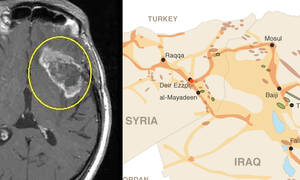GPS satellites broadcast passive one-way signals that by themselves can do no harm. But bad actors can use the power of GPS in frightening ways.
“Driverless vehicles could easily be perverted into a ghastly weapon—a guided missile making full use of sophisticated electronics to direct it interactively to its target in real time. The first precision guided munition used in the 1991 Persian Gulf War was, after all, a cruise missile guided by the same GPS technology that guides driverless cars.”
–Jeffrey W. Lewis, “A Smart Bomb in Every Garage? Driverless Cars and the Future of Terrorist Attacks,” Sept. 28, 2015, START
In this thought-provoking and well-reasoned article, Jeffrey Lewis highlights some sobering concerns about the rapid approach of driverless vehicles and the inevitable misuse of them by people with bad intentions. Many thanks to Lewis for citing our book, GPS Declassified: From Smart Bombs to Smartphones in his article.

How we got here
In the early days of GPS, the military intentionally degrading the civilian signal–it was called Selective Availability–to prevent terrorists from creating a “poor man’s cruise missile.”
Over time, various GPS ground-based augmentation systems emerged to correct inherent signal reception errors caused by the wobble of individual orbits and atmospheric distortions. These were fixed receivers at precisely mapped locations that computed the errors in incoming signals and rebroadcast corrected ones.
These methods began to make Selective Availability less effective, if not obsolete. For a time, the U.S. Department of Transportation and Coast Guard were busy making civilian satellite signals more accurate for ships and planes, even as the U.S. Air Force was distorting them.
Two high-level panels comprised of scientists and policy experts studied this problem in the mid-1990s. The general consensus: the enormous potential benefits of GPS for commerce were being stifled by the relatively smaller margin of safety provided by Selective Availability. The government turned off Selective Availability May 1, 2000, and it has never again intentionally made GPS signals less reliable, even after 9/11.
The tenfold improvement in civilian signal accuracy–30-meter errors shrunk to about 3 meters–sparked a surge in consumer, commercial and scientific uses. Accuracy has steadily improved. Today, civilian GPS use dwarfs military use. In the United States, consumers account for about 59 percent of GPS equipment sales. Commercial users, like farmers and trucking companies, represent 25 percent. The military makes up the remaining 16 percent.
The U.S. government spends about a billion dollars a year maintaining and upgrading GPS, but the economic benefits to the U.S. economy are estimated at between $68 billion and $122 billion annually. Economists seem to have given up trying to estimate worldwide economic benefits because GPS technology has become integral to so many technical processes. GPS atomic-clock timing shows up everywhere, from electric power substations to bank ATMs to cell phones.
GPS signals, by themselves, cannot direct a driverless car. But the same free, accurate positioning capability that powers your phone’s map app, enables other technologies to create a future with autonomous vehicles. A future where distracted drivers, sleepy drivers, drunk drivers, and just plain poor drivers no longer cause 30,000 highway fatalities every year.
It is a shame that technologies with such power for good are so often misappropriated for bad. I’m glad that smart people at organizations like START, the National Consortium for the Study of Terrorism and Responses to Terrorism, are contemplating these potential misuses before they become reality.
We need to hold driverless car developers and the government agencies that oversee them responsible for incorporating safeguards into the technology before it is made available to the public. We built the Internet without a clear vision of how dangerous hacking could become. We can’t say we didn’t see the threat of driverless car bombs coming.


